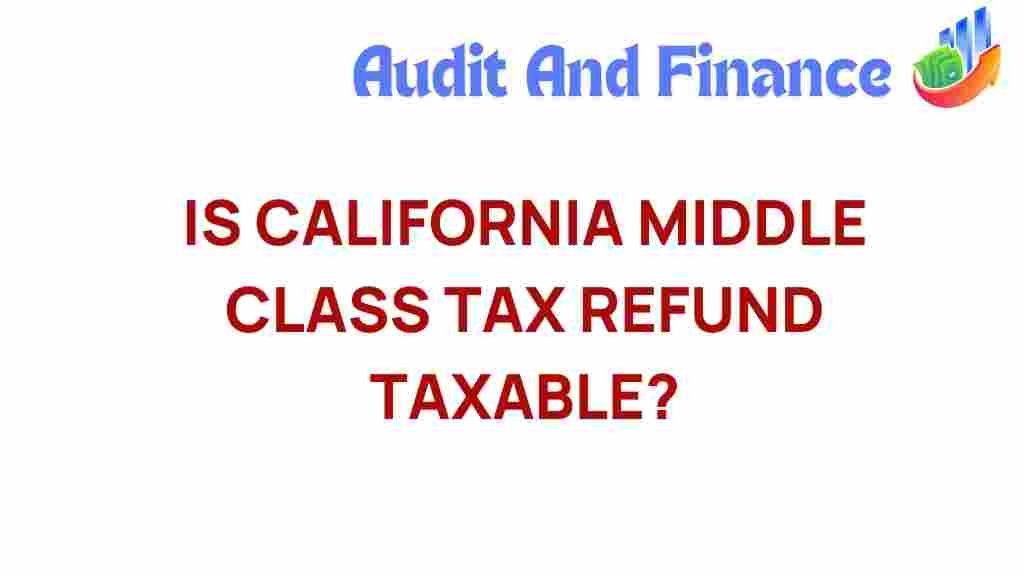Is the California Middle Class Tax Refund Subject to Taxation?
The California Middle Class Tax Refund has been a topic of significant interest and concern among residents of the Golden State. As many taxpayers received this financial relief, questions arose regarding its tax implications. Specifically, is the California tax refund subject to taxation? Understanding the taxation of these refunds is essential for proper financial planning. In this article, we will delve into the details of the California Middle Class Tax Refund, its implications for taxpayers, and the guidelines set forth by the IRS.
Understanding the California Middle Class Tax Refund
The California Middle Class Tax Refund was introduced as part of the state’s efforts to provide financial relief to its residents, particularly in the wake of economic challenges. This program is designed to assist middle-class families and individuals who may be struggling with the rising cost of living.
- Purpose: To provide financial relief to middle-class taxpayers.
- Amount: Varies based on income and family size.
- Eligibility: Must meet specific income thresholds set by the state.
Tax Implications of the California Tax Refund
Now, let’s address the burning question: is the California tax refund subject to taxation? The answer depends on various factors, including IRS guidelines and state tax laws.
IRS Guidelines on State Tax Refunds
According to IRS guidelines, state tax refunds may or may not be taxable. The key factor is whether the taxpayer received a tax benefit from the deduction of state taxes in previous years. If a taxpayer did not itemize deductions in the past or did not receive a tax benefit from state taxes, the refund is generally not taxable.
- Itemized Deductions: If you itemized deductions on your federal tax return in the previous year and deducted state taxes, the refund may be taxable.
- Standard Deduction: If you took the standard deduction, the refund is usually not taxable.
California State Tax Considerations
California residents should also be aware of how state tax laws treat the Middle Class Tax Refund. The California Franchise Tax Board (FTB) has indicated that this refund is not considered taxable income for state tax purposes. This means that residents can enjoy the full benefit of the refund without worrying about additional state tax liabilities.
Step-by-Step Process of Determining Taxability
For taxpayers looking to determine if their California tax refund is subject to taxation, here’s a step-by-step process to follow:
- Review Your Previous Tax Returns: Check if you itemized deductions in the prior year.
- Determine Your Tax Benefit: Assess if you received a tax benefit from your state tax deduction.
- Consult IRS Guidelines: Refer to IRS Publication 525 for detailed information on state tax refunds.
- Check California FTB Guidelines: Review the California FTB’s official statements regarding the Middle Class Tax Refund.
- File Accordingly: When filing your taxes, ensure to report your refund accurately based on your findings.
Taxpayer Awareness and Financial Planning
It’s crucial for taxpayers to stay informed about tax implications related to financial relief measures like the California Middle Class Tax Refund. Being proactive can help mitigate any unexpected tax liabilities.
- Stay Updated: Regularly check for updates from the IRS and California FTB.
- Seek Professional Advice: Consult a tax professional for personalized guidance.
- Plan for Future Refunds: Consider how future financial relief initiatives might impact your tax situation.
Troubleshooting Common Issues
While navigating the tax implications of the California Middle Class Tax Refund, taxpayers may encounter several common issues. Here are some troubleshooting tips:
Issue 1: Confusion Over Taxability
If you’re unsure whether your refund is taxable, refer back to the IRS guidelines and consider contacting a tax professional for clarification.
Issue 2: Incorrect Reporting on Tax Returns
Double-check your tax returns to ensure that all information regarding the California tax refund is reported correctly. Mistakes can lead to delays in processing your return.
Issue 3: Missing Refunds
If you have not received your refund, verify your eligibility and check the status through the California FTB website. You can also contact their customer service for assistance.
Conclusion
In conclusion, understanding whether the California Middle Class Tax Refund is subject to taxation is vital for effective financial planning. While the IRS guidelines indicate that it may be taxable based on previous deductions, California residents do not need to worry about state tax liabilities related to the refund. Taxpayer awareness is essential to navigate these waters effectively.
For more information on tax refunds and to stay updated on guidelines, you can visit the IRS official website or consult a tax professional. By staying informed, you can maximize your financial relief and ensure compliance with tax regulations.
Ultimately, the California Middle Class Tax Refund serves as a crucial support mechanism for many families. Understanding its tax implications will empower you as a taxpayer and help you make informed financial decisions.
This article is in the category Taxation and created by AuditAndFinance Team
